Serving 667 students in grades Kindergarten-5, James A Monaco ranks in the top 30% of all schools in Texas for overall test scores (math proficiency is top 50%, and reading proficiency is top 50%).
The percentage of students achieving proficiency in math is 47% (which is higher than the Texas state average of 41%). The percentage of students achieving proficiency in reading/language arts is 62% (which is higher than the Texas state average of 51%).
The student:teacher ratio of 15:1 is higher than the Texas state level of 14:1.
Minority enrollment is 60% of the student body (majority Black and Hispanic), which is lower than the Texas state average of 75% (majority Hispanic).
Quick Stats (2025)
- Grades: Kindergarten-5
- Enrollment: 667 students
- Student:Teacher Ratio: 15:1
- Minority Enrollment: 60%
- Overall Testing Rank: Top 30% in TX
- Math Proficiency: 47% (Top 50%)
- Reading Proficiency: 62% (Top 30%)
- Science Proficiency: 55-59% (Top 20%)
- Source: National Center for Education Statistics (NCES), TX Dept. of Education
Top Rankings
James A Monaco ranks among the top 20% of public schools in Texas for:
Category
Attribute
Science Proficiency
Diversity
School Overview
James A Monaco's student population of 667 students has grown by 28% over five school years.
The teacher population of 44 teachers has grown by 18% over five school years.
Grades Offered
Grades Kindergarten-5
Total Students
667 students
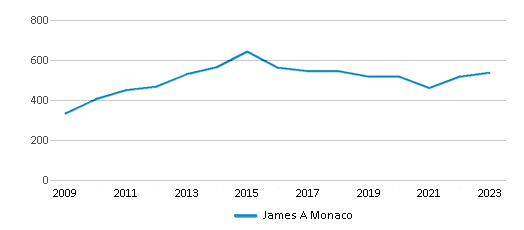
Gender %
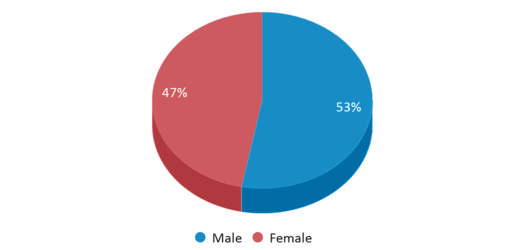
Total Classroom Teachers
44 teachers
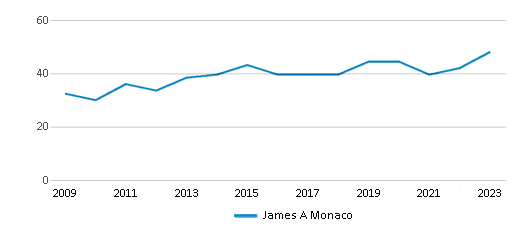
Students by Grade
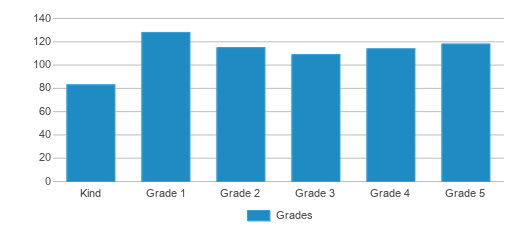
School Rankings
James A Monaco ranks within the top 30% of all 8,188 schools in Texas (based off of combined math and reading proficiency testing data).
The diversity score of James A Monaco is 0.72, which is more than the diversity score at state average of 0.64. The school's diversity has stayed relatively flat over five school years.
Overall Testing Rank
#2091 out of 8188 schools
(Top 30%)
(Top 30%)
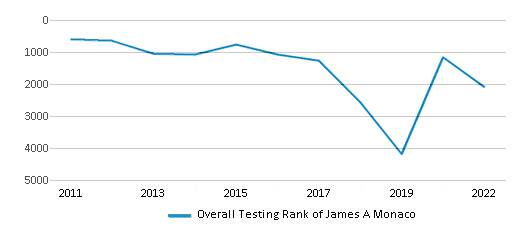
Math Test Scores (% Proficient)
47%
41%
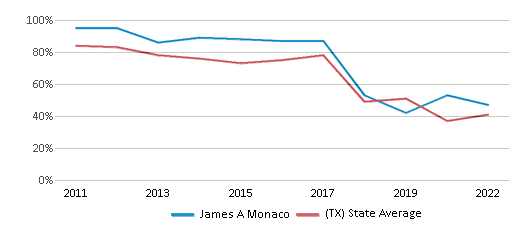
Reading/Language Arts Test Scores (% Proficient)
62%
51%
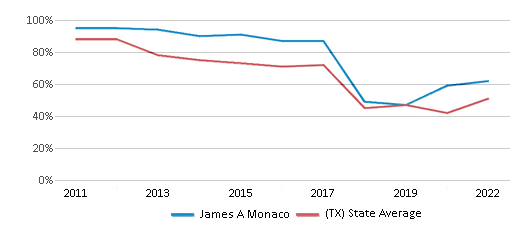
Science Test Scores (% Proficient)
55-59%
46%
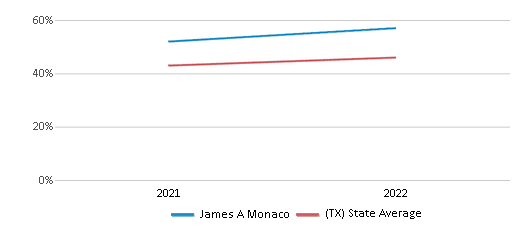
Student : Teacher Ratio
15:1
14:1
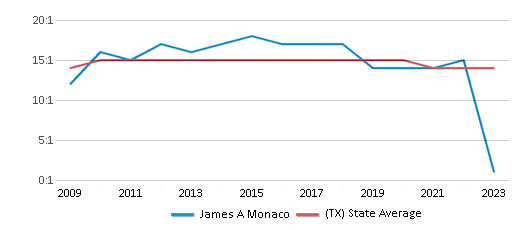
American Indian
n/a
n/a
Asian
3%
6%
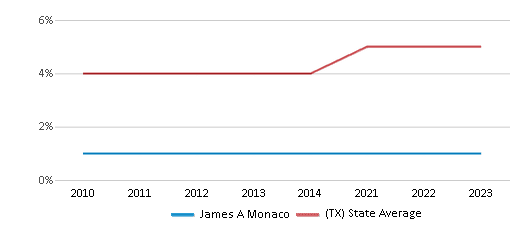
Hispanic
24%
53%
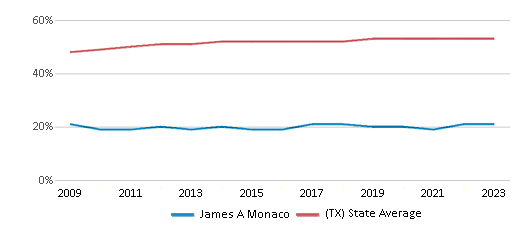
Black
25%
13%
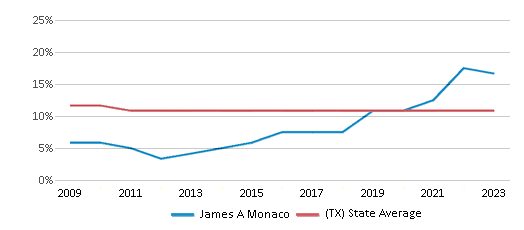
White
40%
25%
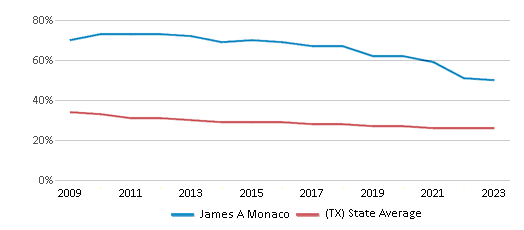
Hawaiian
n/a
n/a
Two or more races
8%
3%
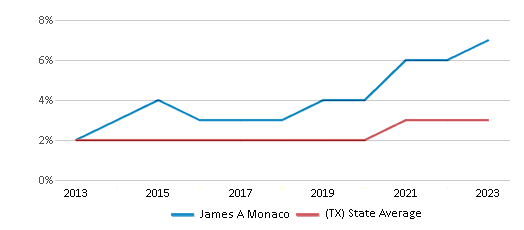
All Ethnic Groups
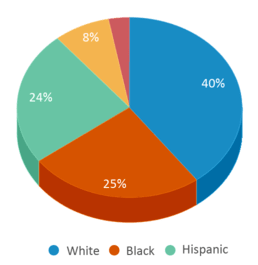
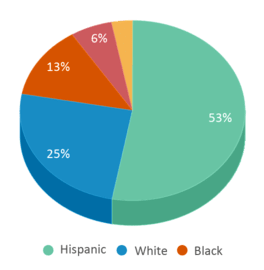
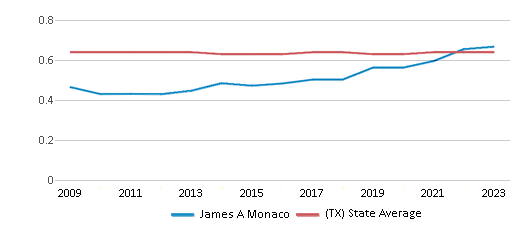
Participates in the National School Lunch Program (NSLP)
Yes
Eligible for Free Lunch
30%
57%
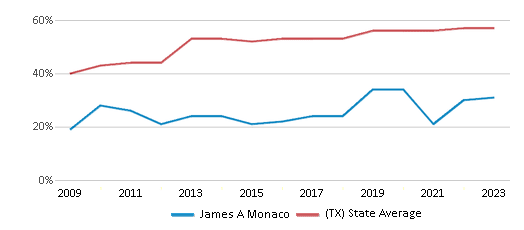
Eligible for Reduced Lunch
4%
5%
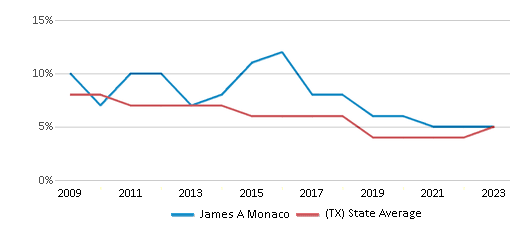
School Statewide Testing
School District Name
Source: National Center for Education Statistics (NCES), TX Dept. of Education
Profile last updated: 02/09/2025
Frequently Asked Questions
What is James A Monaco's ranking?
James A Monaco is ranked #2091 out of 8,188 schools, which ranks it among the top 30% of public schools in Texas.
What schools are James A Monaco often compared to?
James A Monacois often viewed alongside schools like Cross Oaks Elementary School, Providence Elementary School by visitors of our site.
What percent of students have achieved state testing proficiency in math and reading?
47% of students have achieved math proficiency (compared to the 41% TX state average), while 62% of students have achieved reading proficiency (compared to the 51% TX state average).
How many students attend James A Monaco?
667 students attend James A Monaco.
What is the racial composition of the student body?
40% of James A Monaco students are White, 25% of students are Black, 24% of students are Hispanic, 8% of students are Two or more races, and 3% of students are Asian.
What is the student:teacher ratio of James A Monaco?
James A Monaco has a student ration of 15:1, which is higher than the Texas state average of 14:1.
What grades does James A Monaco offer ?
James A Monaco offers enrollment in grades Kindergarten-5
What school district is James A Monaco part of?
James A Monaco is part of Aubrey Independent School District.
In what neighborhood is James A Monaco located?
James A Monaco is located in the Providence Village neighborhood of Aubrey, TX.
School Reviews
5 3/23/2019
Great school
4 7/19/2017
Love the teachers!!! Overall its a great school! The reasons I rate this school a 3 instead of a 5 is because 1) they have too much homework. 2) the dress code is silly 3)they don't have an art teacher. Pto volunteers come to do an art project 1 time per month and the kids dont have a lot of opportunity for after school clubs or activities.
2 9/20/2013
I enrolled my daughter to go to this school this fall, and was told that her grade level was full and she would be bussed to another elementary school in the district. That school told me they we nearing their limit for that grade level, and they weren't sure there would be a spot for her. Hello, they are public schools and must accept a child that lives in the district. I found out that this is a constant problem and you must be the first in line to register your child every year to ensure a spot in the school. We ended up buying a home in another district, partly to avoid this mess. There are siblings going to different elementary schools in this district because of Monaco's refusal to accommodate their growing population. There are students who parents pay to get into Monaco, and they have a spot, but my daughter was refused one. I find this so wrong. Money is the bottom line to this school. Not what's best for the child. Registration in a public school should not be a competition. I'm happy that the contract on the house we were purchasing fell through so we don't have to put up with this headache every year.
Review James A Monaco. Reviews should be a few sentences in length. Please include any comments on:
- Quality of academic programs, teachers, and facilities
- Availability of music, art, sports and other extracurricular activities
Recent Articles

What Is A Charter School?
Explore the world of charter schools in this comprehensive guide. Learn about their history, how they operate, and the pros and cons of this educational innovation. Discover key facts about charter schools, including admission policies, demographics, and funding, as well as what to look for when considering a charter school for your child.

10 Reasons Why High School Sports Benefit Students
Discover the 10 compelling reasons why high school sports are beneficial for students. This comprehensive article explores how athletics enhance academic performance, foster personal growth, and develop crucial life skills. From improved fitness and time management to leadership development and community representation, learn why participating in high school sports can be a game-changer for students' overall success and well-being.

February 05, 2025
Understanding the U.S. Department of Education: Structure, Impact, and EvolutionWe explore how the Department of Education shapes American education, from its cabinet-level leadership to its impact on millions of students, written for general audiences seeking clarity on this vital institution.





